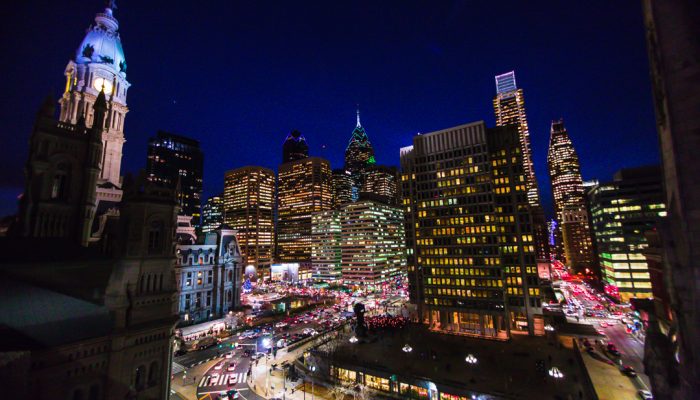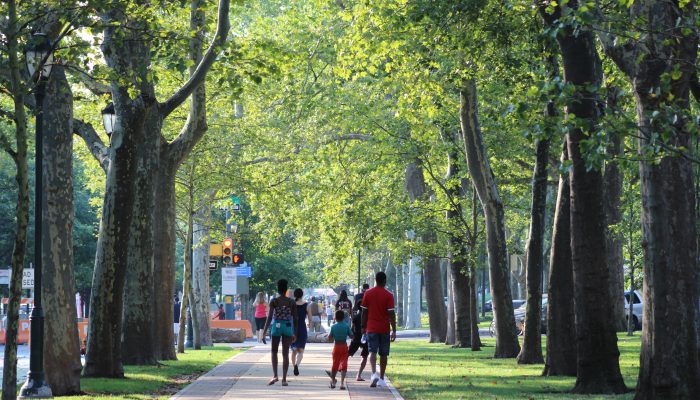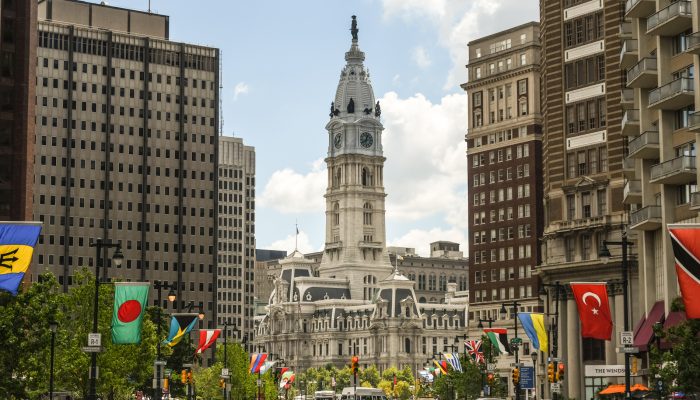June 20 was a big day for fighting climate change in Philadelphia. 80% of the climate change-causing carbon emissions in Philadelphia come from buildings and industry, so energy efficiency and clean energy are important parts of Greenworks, the City’s plan for sustainability. Read on to learn how four recent pieces of legislation introduced or passed by Philadelphia City Council will address climate change and bring Philly closer to our clean energy vision.
Solar Rebates
City Council passed legislation to create the Solar Rebate Program, which gives commercial and residential properties in Philadelphia financial incentives to install solar. The program will run from July 1, 2019 through June 30, 2024.
The bill was introduced by Councilmember Reynolds Brown, chair of the Committee on the Environment, in order to supplement the Federal Solar Tax Credit Program which has offset the cost of solar installations by 30% since 2006. The Federal Solar Tax Credit Program is set to decrease in 2020 and expire completely in January 2022.
The Philadelphia Solar Rebate program will ensure the city’s progress towards cutting carbon pollution 80% by 2050 by helping to make solar installations more affordable. Residents will receive $.20 per watt for new installations, while commercial customers will receive $.10/watt – for the average Philadelphia solar installation, this will result in an average rebate of $1,000. Thanks to this rebate and Philadelphia Energy Authority’s Solarize Philly program, solar energy has never been more affordable for Philadelphia residents and businesses.
C-PACE
Philadelphia City Council also passed a bill to adopt Commercial Property Assessed Clean Energy, or C-PACE.
C-PACE is a financing tool allowing commercial building owners to finance energy efficiency, water conservation, and renewable energy projects through their property tax payment. Powering Our Future, the city’s clean energy vision, estimates that clean energy projects financed through C-PACE will reduce the amount of carbon entering the atmosphere and provide significant bill savings to customers.
Program guidelines for C-PACE were established through a stakeholder engagement process led by advocates across Pennsylvania, including the Philadelphia Energy Authority, which expects to implement the program locally.
Building Energy Performance Policy
Since 2013 Philadelphia’s largest buildings have reported their energy and water usage as part of the city’s energy benchmarking program. In partnership with the City of Philadelphia Office of Sustainability and the Bloomberg American Cities Climate Challenge, Councilmember Reynolds Brown introduced a bill that further requires energy performance actions by these buildings:
The Building Energy Performance bill will require non-residential buildings over 50,000 square feet to either:
- Affirm their status as a high performing facility (e.g. LEED or ENERGY STAR certification), or
- Perform a building “tune-up” on existing systems and controls that will bring the building up to a state of good repair.
In addition to cutting carbon emissions, this policy will also increase tenant comfort and save building owners money. A building tune-up policy was one of the most impactful strategies identified in Powering Our Future, and a key recommendation of our Clean Energy Vision Action Plan.
Plastic Bag Bill
Did you know that plastic bags are used for an average of 12 minutes before being thrown away? Plastic bags take about 500 years to breakdown in a landfill. As they break down, they become “microplastics” that further pollute our water, soil, and even the air!
Philadelphia City Council introduced a bill to ban single-use plastic bags and non-recyclable paper bags. The bill will ensure that places like supermarkets, convenience stores, department stores, restaurants, and delivery services provide bags that have a longer use with fewer environmental impacts. In addition, the bill will also impose a 15 cent fee per reusable or recyclable paper bag.
Check out the proposed bill to learn more. Because the production and disposal of plastic relies on carbon-emitting fossil fuels, this bill represents another way the city is moving towards our clean energy vision.




